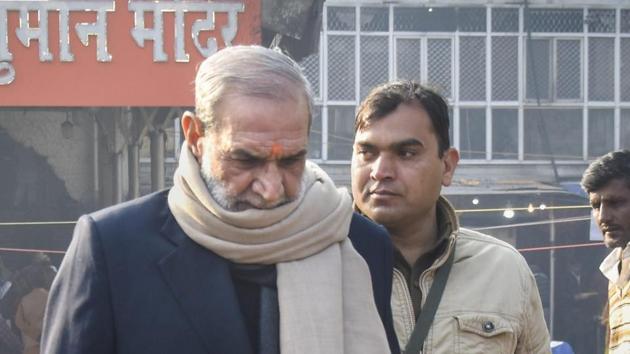‘Have 8 grandchildren’: 1984 anti-Sikh riots convict Sajjan Kumar seeks 30 days to surrender
Sajjan Kumar had been convicted by the Delhi High Court after it reversed the Trial Court’s order acquitting him in the case.
Former Congress leader Sajjan Kumar, who was convicted and sentenced to jail for the remainder of his life in the 1984 anti-Sikh riots case on December 17, has moved an application before the Delhi High Court and has sought 30 days’ time to surrender.

The court is likely to hear his application tomorrow. Senior advocate HS Phoolka, who has been fighting the case for the victims of the 1984 riots, said that they will oppose Sajjan Kumar’s application.
“Sajjan Kumar has filed an application in Delhi High Court to give him a month to surrender. We will oppose that application tomorrow,” Phoolka said.
Sajjan Kumar was appearing in court in another case in the 1984 anti-Sikh riots case. Kumar surrendered his mobile phone before the court following its December 17 directions.
The court adjourned the matter for January 22 after he said his main counsel was unavailable.
In his application, Sajjan Kumar stated that he had been on bail throughout the trial and “is currently under shock and surprise in view of the order of acquittal having been set aside and the Applicant (Sajjan Kumar) convicted...”
The application, which seeks time till January 31 for his surrender, also states that “in view of the present position, [he] would not be in a position to settle his family affairs including affairs with regard to the properties of his within short a span of time”. The application also states that he has to settle his family affairs including affairs related to inheritance and other issues.
The application also said that the Applicant (Sajjan Kumar) is “seeking extension as applicant has statutory remedy to file an appeal for which he has to engage senior counsels in the Hon’ble Supreme Court of India and brief the Senior counsels. Presently most of the senior advocates are on holidays as the Hon’ble Supreme Court is closed for vacation
In the case before the trial court, three persons -- Kumar, Brahmanand Gupta and Ved Prakash -- are facing trial on charges of murder and rioting pertaining to the killing of Surjit Singh in Sultanpuri.
On December 17, Sajjan Kumar had been convicted by the Delhi High Court after it reversed the Trial Court’s order acquitting him in the case. The court also slapped a fine of ₹5 lakh on him in the case.
A day after being convicted and sentenced, Sajjan Kumar had resigned from the primary membership of the Congress in a letter to party president Rahul Gandhi.
The case relates to the murder of five members of a family during the anti-Sikh riots in the Raj Nagar area in Delhi Cantonment on November 1, 1984.
“What happened in the aftermath of the assassination of the then Prime Minister was carnage of unbelievable proportions in which over 2,700 Sikhs were murdered in Delhi alone. The law and order machinery clearly broke down and it was literally a ‘free for all’ situation which persisted. The aftershocks of those atrocities are still being felt,” justice S Muralidhar and justice Vinod Goel said while handing the 203-page judgement.
The judges recalled the violence in which thousands of Sikhs were killed, some burnt alive, as their houses were destroyed in Delhi and across the country.
“A majority of the perpetrators of these horrific mass crimes, enjoyed political patronage and were aided by an indifferent law enforcement agency ... The criminals escaped prosecution and punishment for over two decades.”
“There was an abject failure by the police to investigate the violence which broke out in the aftermath of the assassination of the then Prime Minister Smt. Indira Gandhi is apparent from the several circumstances highlighted hereinabove.”
There was an “utter failure” to register separate first report information in the case of five deaths in which Congress leader Kumar and others were sentenced.
“The failure to record any incident whatsoever in the DDR and the lack of mention of PW-1’s statement therein, amongst other circumstances, established the apathy of the Delhi Police and their active connivance in the brutal murders being perpetrated,” the court had observed.






